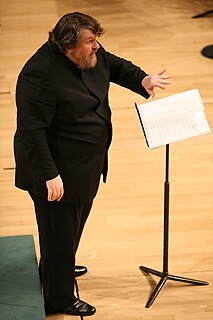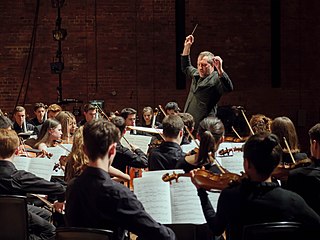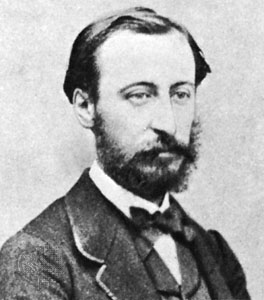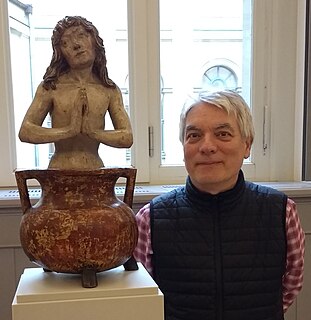Related Research Articles

The City of Birmingham Symphony Orchestra (CBSO) is a British orchestra based in Birmingham, England. It is the resident orchestra at Symphony Hall, Birmingham, which has been its principal performance venue since 1991. Its administrative and rehearsal base is at the nearby CBSO Centre, where it also presents chamber concerts by members of the orchestra and guest performers.
Mark-Anthony Turnage CBE is an English composer of classical music.

Stuart Oliver Knussen was a British composer and conductor.

Thomas Joseph Edmund Adès is a British composer, pianist and conductor. Five compositions by Adès received votes in the 2017 Classic Voice poll of the greatest works of art music since 2000: The Tempest (2004), Violin Concerto (2005), Tevot (2007), In Seven Days (2008), and Polaris (2010).

Rodion Konstantinovich Shchedrin is a Soviet and Russian composer and pianist, winner of USSR State Prize (1972), the Lenin Prize (1984), and the State Prize of the Russian Federation (1992), and is a former member of the Inter-regional Deputies Group (1989–1991). He is also a citizen of Lithuania and Spain.
Sinfonia concertante is an orchestral work, normally in several movements, in which one or more solo instruments contrast with the full orchestra. It emerged as a musical form during the Classical period of Western music from the Baroque concerto grosso. Sinfonia concertante encompasses the symphony and the concerto genres, a concerto in that soloists are on prominent display, and a symphony in that the soloists are nonetheless discernibly a part of the total ensemble and not preeminent. Sinfonia concertante is the ancestor of the double and triple concerti of the Romantic period corresponding approximately to the 19th century.
Ruth Dorothy Louisa ("Wid") Gipps was an English composer, oboist, pianist, conductor, and educator. She comppsed music in a wide range of genres, including five symphonies, seven concertos, and numerous chamber and choral works. She founded both the London Repertoire Orchestra and the Chanticleer Orchestra and served as conductor and music director for the City of Birmingham Choir. Later in her life she served as chairwoman of the Composers' Guild of Great Britain.

Hans Abrahamsen is a Danish composer born in Kongens Lyngby near Copenhagen. His Let me tell you (2013), a song cycle for soprano and orchestra, was ranked by music critics at The Guardian as the finest work of the 21st-century. His opera The Snow Queen was commissioned and premiered by the Royal Danish Theatre in 2019.
Julian Anderson is a British composer and teacher of composition.

The Piano Concerto No. 4 in C minor, Op. 44 was composed by Camille Saint-Saëns in 1875. It was premièred on October 31, 1875, at the Théâtre du Châtelet of Paris, with the composer as the soloist. The concerto is dedicated to Anton Door, a professor of piano at the Vienna Conservatory. It continues to be one of Saint-Saëns' most popular piano concertos, second only to the Piano Concerto No. 2 in G minor.

Simon Holt is an English composer.
This is the discography of Simon Rattle and other produced works by the English conductor.
Michael Seal is a British orchestral conductor and classical violinist. Since 2011 he has served as the Associate Conductor of the City of Birmingham Symphony Orchestra (CBSO), having served previously as the orchestra's Assistant Conductor. He is only the second conductor to be given the title of Associate Conductor at the CBSO. The first was Harold Gray who served in that capacity for several decades until his retirement in 1972. In addition to his conducting, Seal played in the violin section of the CBSO from 1992 to 2014.
David Sawer, is a British composer of opera and choral, orchestral and chamber music.
Benjamin Britten's Piano Concerto, Op. 13, is the composer's sole piano concerto.
Charlotte Bray is a British composer. She was championed by the Royal Opera House Covent Garden, London Sinfonietta and Birmingham Contemporary Music Group, BBC Symphony Orchestra. Her music has been performed by many notable conductors such as: Sir Mark Elder, Oliver Knussen, Daniel Harding, and Jac van Steen.
Soundings is an orchestral composition by the American composer Elliott Carter. The work was commissioned by the Chicago Symphony Orchestra for their final season with the conductor Daniel Barenboim as music director. It was first performed on October 6, 2005 at the Symphony Center, Chicago, by Barenboim and the Chicago Symphony Orchestra.
The Concerto for Piano and Orchestra is a composition for solo piano and orchestra by the Polish composer Witold Lutosławski. The music was commissioned by the Salzburg Festival. It was first performed at the festival on August 19, 1988 by the pianist Krystian Zimerman and the Austrian Radio Orchestra under the direction of the composer. Lutosławski dedicated the piece to Zimerman.
The Double Concerto for Violin, Piano, and Strings is a composition by the Danish composer Hans Abrahamsen. The work was commissioned by the Royal Danish Orchestra and the Swedish Chamber Orchestra and was composed between 2010 and 2011. Its world premiere was given by the sister duo of the violinist Baiba Skride and the pianist Lauma Skride with the Royal Danish Orchestra under the direction of André de Ridder in [Copenhagen on October 9, 2011. The piece is dedicated to Baiba & Lauma Skride, Wiebke Busch, and André de Ridder.

Klaviermusik mit Orchester, Op. 29, is a 1923 piano concerto by Paul Hindemith. Subtitled Klavier nur linke Hand, it is a piano concerto for the left hand alone. It was commissioned by the pianist Paul Wittgenstein, who lost his right arm in the World War. He never played the piece, and when he died, his widow refused access to the score. The premiere, after her death, was played in Berlin in 2004, with Leon Fleisher as the soloist and the Berlin Philharmonic conducted by Simon Rattle. It was published by Schott.
References
- 1 2 3 Abrahamsen, Hans (2015). "Left, alone". G. Schirmer Inc. Retrieved July 6, 2016.
- ↑ "New music showcased by CBSO". The Birmingham Press. 2 February 2016. Retrieved July 6, 2016.
- ↑ Robin, William (March 9, 2016). "Hans Abrahamsen: Fame and Snow Falling on a Composer". The New York Times . Retrieved July 6, 2016.
- ↑ Franks, Rebecca (May 4, 2016). "CBSO/ Ilan Volkov at Symphony Hall, Birmingham". The Times . Retrieved July 6, 2016.
- ↑ Bratby, Richard (29 April 2016). "Tharaud, CBSO, Volkov, Symphony Hall Birmingham". The Arts Desk . Retrieved July 6, 2016.